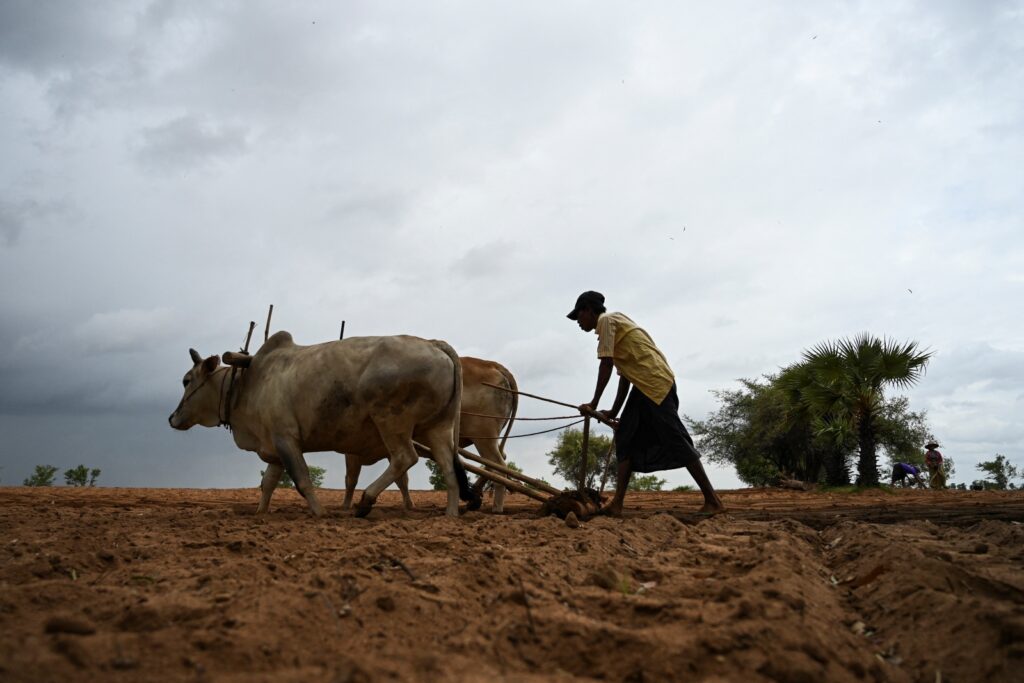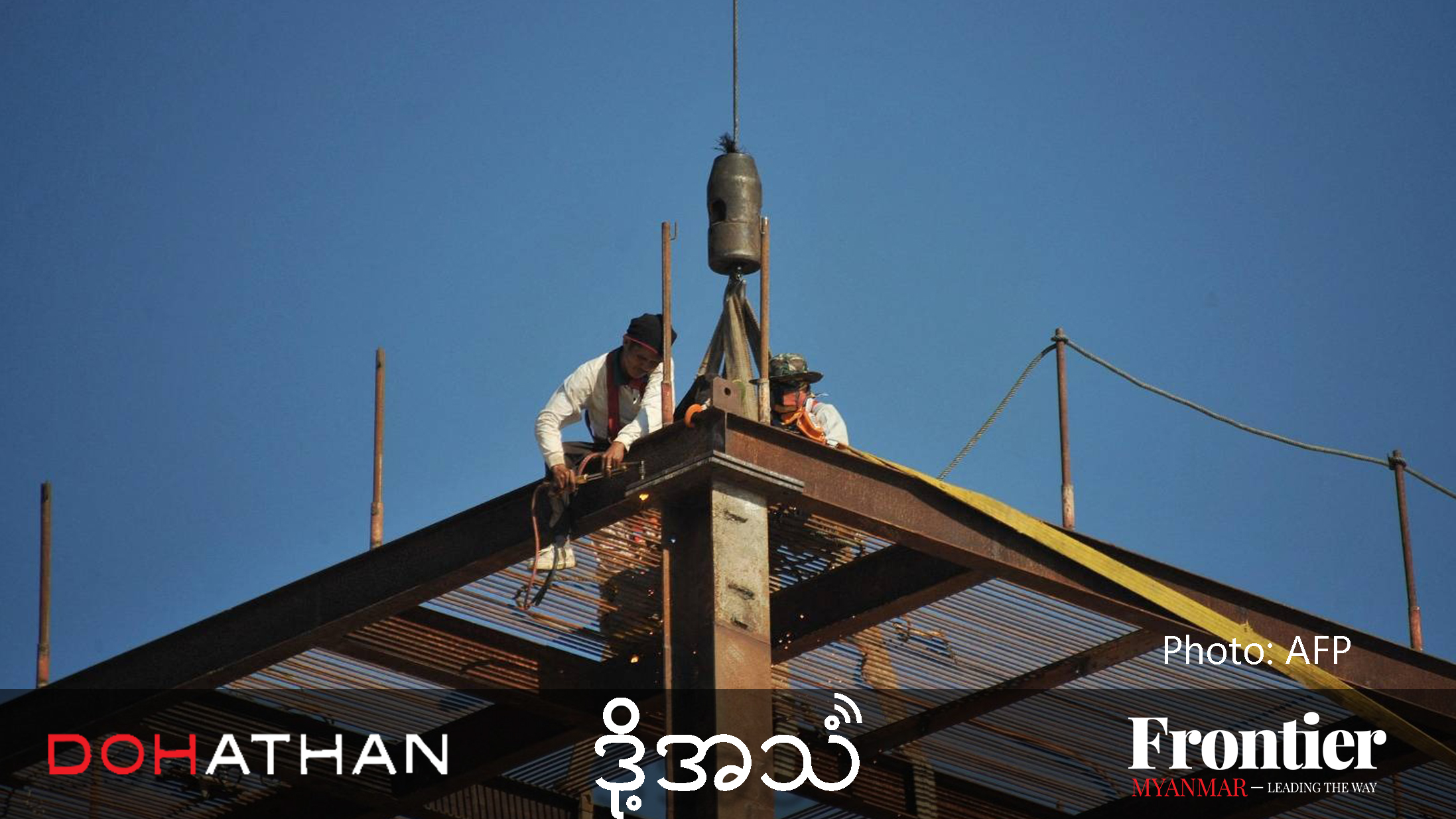Rural development programmes in Myanmar have lagged after the 2021 coup, recalling the neglect, incompetence, corruption and isolation of past military regimes.
By FRONTIER
When Ko Paw Lu’s* 62-year-old mother suddenly collapsed at home in Ayeyarwady Region’s Danubyu Township, he rushed her to a doctor. She was diagnosed with a stroke due to blood clots in her brain and told to seek care in Yangon, Myanmar’s former capital and largest city, usually about a four hour journey by car.
“He told us to go to Yangon General Hospital, which has a neurology department, and said that she would be saved if she can receive thrombolytic therapy in time,” Paw Lu recalled. “The village’s volunteer team helped transfer her with their vehicle.”
But it was September, at the peak of the rainy season, and the main road was so badly damaged that some sections of it couldn’t be used at all.
“In our region, there are many small bridges passing over creeks. Most of them are made of wood and are damaged by frequent use. When we drive over them, we can only pray they don’t collapse,” Paw Lu said.
They had no choice but to take a longer route, using the smaller, more recently-built roads that connect the villages.
“We couldn’t make it in time, I lost my mother on the way,” Paw Lu said.
U Mya Thar*, a former village administrator, said that the village roads were built in 2018 after Danubyu started receiving funds from the National Community Driven Development Project funded by the World Bank.
“These roads are newer than the main road. So, the buses and trucks enter into the villages to use those roads to avoid the damaged parts of the main road. But if they keep using them, the village roads will be damaged very soon too,” said the administrator, who resigned in protest against the coup.
And if damaged, they are unlikely to be repaired. Under decades of military rule prior to 2011, rural development in places like Ayeyarwady was minimal. With the return of a junta to Nay Pyi Taw, critics say development is once again falling behind due to neglect, incompetence, corruption and a lack of international donor funds.
Paw Lu said even the main road to Yangon was only built in 2013, under the quasi-civilian Union Solidarity and Development Party government, which came to power in 2011. The USDP ushered in a 10-year period of democratic reform that led to the National League for Democracy’s historic election victory in 2015, but which was ended by the February 2021 military coup.
“We’ve only been able to use that road during the rainy season for the last 10 years. Before then, no one could drive and buses even stopped working for four months. We had to use the water routes if we wanted to go to Yangon,” he explained. “If the roads aren’t repaired, eventually we will go back to what it was like a decade ago.”
Daw Chaw*, an NLD MP who was elected to the Ayeyarwady regional parliament in 2020, told Frontier that military authorities don’t prioritise basic infrastructure and the general needs of rural communities.
“It hasn’t even been a decade since the village people began to see and feel development. Especially under the government led by Daw Aung San Suu Kyi, they got transportation, electricity and internet. After the coup, the development projects in most villages immediately stopped, and the lives of the people went back 10 years,” she said.

The good old days
During the 2013-2014 fiscal year, under the USDP, the World Bank issued a US$80 million grant for the NCDDP. It was the World Bank’s first activity in Myanmar in over 20 years, a sign of the international community’s optimism about the country’s direction, which evaporated after the coup. Due to the pilot project’s success, the World Bank issued another $400 million in credit in 2015.
The NCDDP was originally managed by the Ministry of Cooperatives and Rural Development. But when the NLD took power in 2016, it tried to streamline the bloated government by consolidating and reducing the number of ministries. The Ministry of Cooperatives and Rural Development became a Department for Rural Development under the agriculture ministry. But the junta undid many of those reforms, including resurrecting the rural development ministry.
The NCDDP was focused on some of the poorest communities, starting in Kanpetlet Township in Chin State, Namhsan Township in Shan State’s Palaung Self-Administered Zone and Kyunsu Township in Tanintharyi Region. By the time of the coup, the programme had expanded to 63 townships, reaching more than 7 million people in 12,000 villages.
“The villagers had the right to decide which sectors they wanted to develop,” said Mya Thar, the former village administrator. “For instance, if the village needed electricity, they could use the funds for electricity. If the village had a bad transportation system, they could improve it. Such a plan was very effective. In three years, the villages in our township developed considerably.”
But a former NCDDP staffer in Danubyu said that the programme was completely halted by the coup.
“After the coup, many village committee members and contracted officers of NCDDP resigned from their positions. Also, officials from the Department of Rural Development joined the Civil Disobedience Movement,” he said, referring to the mass strike of civil servants to protest against the military takeover, which he also joined. “When the situation stabilised, some local officials tried to withdraw the funds but the Department of Rural Development said the funds had been transferred to the states.”
Administrative units with majority ethnic minority populations are classified as states, some of which are among the poorest and least developed parts of the country. But in reality, NCDDP funds were not being transferred to these communities in need. International donors, including the World Bank and Asian Development Bank, had simply stopped issuing loans after the coup.
ABD communications official Mr. Robert Davis confirmed to Frontier that transfers have not resumed.
“ADB has temporarily put on hold sovereign project disbursements and new contracts in Myanmar effective 1 February 2021. This includes disbursements for the Resilient Community Development Project. We continue to assess the evolving situation in Myanmar in communications with our shareholders, development partners, and the international community,” he said on November 7.
Electric dreams switched off
When Danubyu was added to the NCDDP in 2017, the first order of business was connecting the township to the national electricity grid. Prior to the democratic transition, less than 25 percent of the population had access to the national grid, with many using different methods to jerry-rig electricity, a process known as “self-reliant electricity”.
In some places, communities used solar power to create a mini grid, while others relied on diesel generators. In Danubyu, self-reliant electricity took the form of villagers buying their own electricity towers and cables, and hiring civil servants from the electricity department to connect them to Ahpauk, the nearest town with power.
U Moe Win*, a member of the volunteer self-reliant electricity committee in a Danubyu village tract, said it cost a one-time fee of K500,000 per household to set up in 2009.
“We needed to collect that amount of money from each household in order to cover the cost of the poles and cables,” he said. “Only well-off families could afford electricity at that time.”
But after being granted NCDDP funds in 2017, the entire township was able to access electricity at much lower rates.
Daw Aye Mya*, in Dedaye Township, was thrilled when her local administrator announced in November 2020 that her township was among 13 selected to join the next batch of NCDDP projects. She dreamed of cooking on an electric stove without needing to collect firewood, and her children marveled at the possibility of watching television whenever they wanted.
“When our township was chosen for NCDDP for the 2020-2021 fiscal year, we hoped that we would get electricity. But they had just finished the initial training for the project when the coup happened, and all activities stopped. We never heard anything about it again,” Aye Mya said.

The return of crony development
Under the previous military regime, rural development was intertwined with crony capitalism, and most contracts went to companies linked to the military. Starting with the USDP, there were efforts to reform this process, including by issuing contracts via a public tender, although accusations of corruption and favouritism continued even under the NLD.
Since the coup, there has been significantly less transparency. Before then, the Department of Rural Development would share updates on its activities in state-owned media and publish its annual budgets, but this financial information hasn’t been made public after the coup, despite the regime claiming some activities have continued.
A former civil servant from Ayeyarwady Region, who left the Department of Rural Development to join the CDM after the coup, said corruption was still present even under the NLD, but has likely worsened considerably under the military.
“The DRD is a department that has to build basic infrastructure like roads, bridges and clean water. The way it works is the department doesn’t build them itself, but calls for tenders. The contracted company that wins the tender then builds the project with a budget granted from the department,” he explained. “So the contractors have to maintain a good relationship with the department, which leads to a lot of corruption under the notion of ‘paying respect’ within Myanmar culture.”
In a sign of the new normal, former village administrator Mya Thar said a bridge collapsed early last year, and the Danubyu Township department of rural road development issued a contract for a two-year project to rebuild it.
“I’ve never hard of allocating a two-year budget for an 80-foot bridge,” he said. “The bridge has been under construction by the company that won the tender since last year and has not yet been completed.”
Instead, the villagers have had to collect funds themselves to build and periodically repair a temporary wooden bridge next to the one under construction.
“For rural communities, difficulties come one after another, and they will never end under the coup government,” Mya Thar said.
*indicates the use of a pseudonym for security reasons







